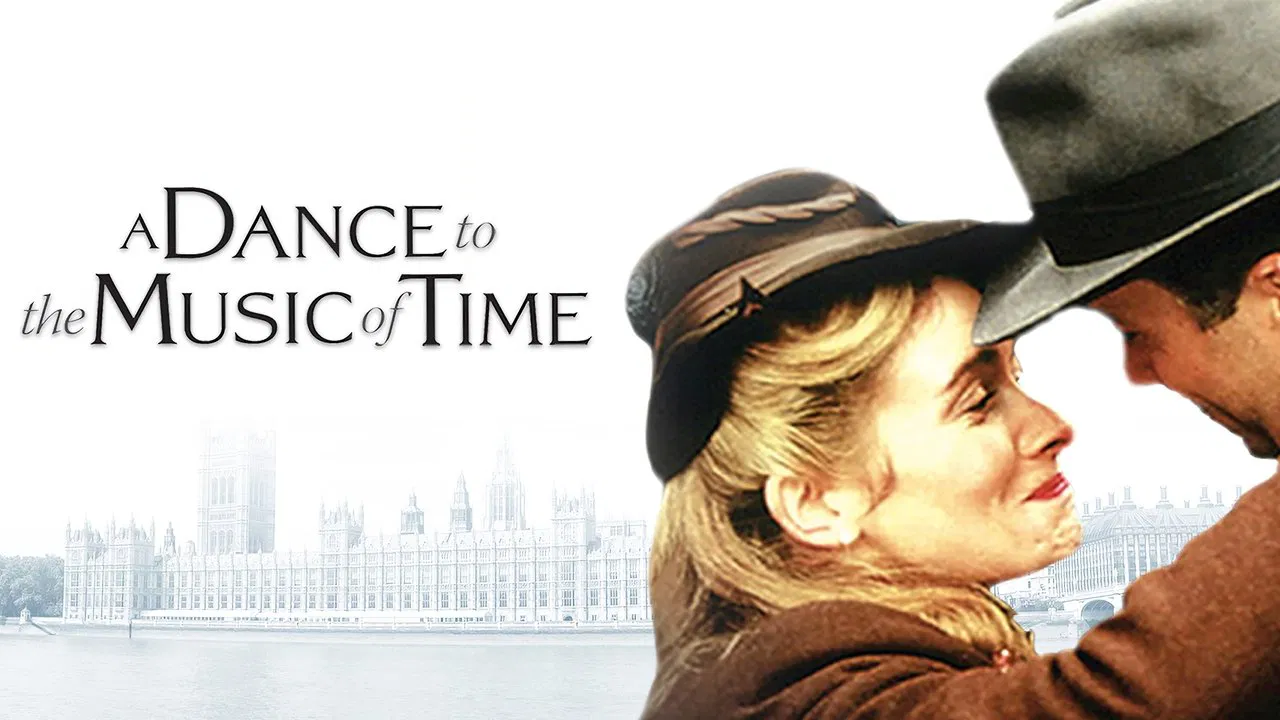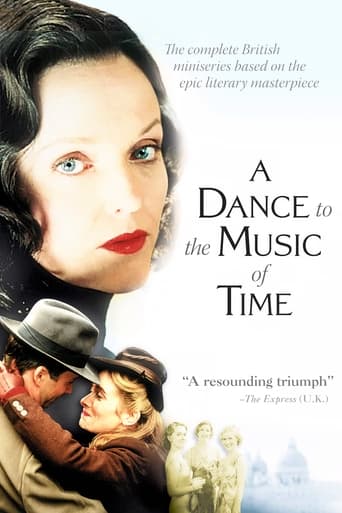

This movie was so-so. It had it's moments, but wasn't the greatest.
... View MoreIn other words,this film is a surreal ride.
... View MoreThe film's masterful storytelling did its job. The message was clear. No need to overdo.
... View MoreThe best films of this genre always show a path and provide a takeaway for being a better person.
... View MoreStarting in the 1920s this four part series is centred on Nick Jenkins, a public school boy, and his circle of friends. Over the next five decades their lives are intertwined along with those of their families and associates. As time passes the fall in love, marry, and in some cases fall out of love or die. While Nick is a fairly ordinary chap those around him aren't; most notably Kenneth Widmerpool at school he is considered somewhat of a joke but later he rises higher and higher; first in the military then in politics. Meanwhile another friend who seemed destined for effortless success sinks into alcoholism and obscurity. As time passes more and more people enter the story; each somehow connected to the original friends who met at school.The plot to this series might not make it sound too exciting; it is more a case of observing people's lives than a traditional drama. To my mind this wasn't a problem though; the characters were interesting and didn't always act as one might first expect. It does of course rely on a lot of coincidences as the cast keep meeting the people they know in a variety of locations. The story features many really funny moments as well as some tragedies. The large cast does an impressive job; most notably Simon Russell Beale, who does a great job portraying Widmerpool from schoolboy to old man, James Purefoy who played Jenkins in the first three episodes and Miranda Richardson, who puts in an unforgettable performance as Femme Fatale Pamela Flitton. The opening scene, where Claire Skinner opens the door to Jenkins while stark naked may make some viewers get the wrong idea about what sort of series this will be; apart from that scene there is only a small amount of non-sexual nudity and a small amount of swearing; not enough to offend most people. Overall I'd recommend this series; just don't expect lots of 'stuff' to happen.
... View MoreI should preface my remarks by saying that I've not read the source material (Anthony Powell's twelve semi-autobiographical novels) so I can't comment on that aspect of the story. My frustration with the protagonist Nick Jenkins passivity no doubt reflects Powell's original creation. I thought that James Purefoy did a credible job portraying Jenkins and it was a relief to see him take a break from the usual scenery chewing, sneering and smirking he so often exhibits in his period film performances. To the contrary -- he's understated and passive to the point of bewilderment which, I presume, was Powell's intention.Much of the rest of the cast is excellent (and any frequent viewer of British period films will recognize many fine character actors), although the characters themselves are often inexplicably unappealing. Throughout it all, Jenkins stays collegial, if not congenial, with every one of them, no matter how despicable they might be. That struck me as unbelievable, but again -- I suspect that Powell was using Jenkins as a personification of the British trait of "getting on with people". Fair enough.What, then, is my objection to "A Dance to the Music of Time"? They are three, two of which have to do with the structure of the story. First, the adaptation feels forced and is hugely uneven. You always know things are going badly in a film when characters employ declamation to introduce themselves. "Why hello, young Winston Churchill! You may not remember me, but I'm the Prince of Wales." (I just made that up for effect, but it reflects the tin-eared dialogue often employed in the miniseries when it needs to Tell Us Something.) Yes, it's madness to try to abridge 12 novels down to seven hours on film, but that decision largely doomed the miniseries' credibility.Second, the further along the film goes, the less focus it has. It wanders off into one utterly pointless subplot after another, trying to express the passage of time and zeitgeists along the way. No sale. It feels forced and perfunctory.Finally, due to the timeframe of the film (1920s through '60s), characters must age. And yet, for some inexplicable reason, James Purefoy is one of the very few who is replaced with a different (and older) actor, and one who looks nothing like him. This requires more awkward exposition ("Hello, Bill. You may not remember me, but I'm Nicholas Jenkins, even though I look nothing like the Nick Jenkins you knew in Episode Three.") Why was this done? Widmerpool and most of the other actors progressively age (to varying degrees of believability), but just swapping out the protagonist for a different actor torpedoes the film's credibility all the more. Inexplicably, Miranda Richardson not only portrays the same character throughout, she does not age one year. Absurd.Ultimately, this film left me scratching and shaking my head. Perhaps the books bring something more to the story, but the film felt like a contrived string of events both banal and pseudo-historic, with a hollow man at the center. We never care about any of the characters, nor do we see anything of substance inside of the protagonist. He's a cypher, an "everyman" and ultimately a bore to follow for seven hours.
... View MoreThough nothing can compare with the books this is quite a fine stab, studded with the finest English talent of its period sensitively cast, and moderately faithful to significant portions of the books. The narrator's voice and perspective are well maintained though oddly James Purefoy is replaced by an excellent but jarring John Standing in the last episode while most of the other actors are cosmetically aged with varying degrees of success. Simon Russell Beale excels but does not dominate as the repulsive Widmerpool and the female characters live as they don't always in the books where they are seen through men's eyes. The music is well chosen and used from Coward's "Twentieth Century Blues" onwards and the use of visual art, including the eponymous Dance is apt.
... View MoreI have to disagree with Mary Smith from America who said that this series was better than Brideshead Revisited. A Dance to the Music of time is almost completely devoid of any charismatic or otherwise engaging characters, with the exception of the likeable Stringham and the repulsive Widmerpool. It gestures towards Brideshead far too obviously (perhaps this was inevitable given the subject matter and the era) and in a way that only demonstrates its relative inferiority. The dialogue and direction are far too stagey, with the result that the character's words just don't ring true. Moreover I felt no concern for any of the characters: they wander aimlessly through their lives and we are offered nothing more than disconnected snapshots to develop our interest. There seems to be no analysis of or motivation for any of their actions: one character kisses another, some people get married, some divorce and some die. There is little by way of analysis: we "see" a lot, but understand (or care for) little of what goes on.I confess that I enjoyed this series in parts. The costumes really are very good and the better actors do try valiantly with this stilted and sterile script. But it really is almost embarrassing compared to the infinitely superior Brideshead. Apart from a few entertaining scenes involving people dying at parties, and a rather enthusiastic display of nudity in the early scenes, this mini-series is really only for those who have read the books, and even then only as a curiosity piece.Perhaps I have come to expect too much of British mini-series after being spoilt by productions such as Brideshead Revisited, Martin Chuzzlewit and Pride and Prejudice. Nonetheless, A Dance to the Music of Time is a barely entertaining, wasted opportunity.
... View More